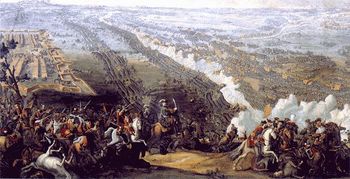1709
| Millennium: | 2nd millennium |
|---|---|
| Centuries: | 17th century – 18th century – 19th century |
| Decades: | 1670s 1680s 1690s – 1700s – 1710s 1720s 1730s |
| Years: | 1706 1707 1708 – 1709 – 1710 1711 1712 |
| 1709 in topic: |
| Subjects: Archaeology – Architecture – |
| Art – Literature (Poetry) – Music – Science |
| Countries: |
| Leaders: State leaders – Colonial governors |
| Category: Establishments – Disestablishments |
| Births – Deaths – Works |
Year 1709 (MDCCIX) was a common year starting on Tuesday (link will display the full calendar) of the Gregorian calendar (or a common year starting on Saturday of the 11-day slower Julian calendar). 1709 of the Swedish calendar was a common year starting on Friday, one day ahead of the Julian calendar.
Contents |
Events of 1709
January–June
- January 6 – Europe's coldest period in 500 years begins during the night, lasting three months and with its effects felt for the entire year.[1] In France, the coast of the Atlantic and Seine River freeze, crops fail, and 24,000 Parisians die.
- January 9 – Abraham Darby I makes the first succesful attempt to use coke in order to produce iron.
- February 2 – Alexander Selkirk is rescued from shipwreck on a desert island, inspiring the book Robinson Crusoe by Daniel Defoe.
- February – In America, Mardi Gras is celebrated one more time with Masque de la Mobile in the capital of French Louisianne, Mobile (Alabama), before Mobile is moved 27 miles (43 km) down the Mobile River to Mobile Bay in 1711.
- June 27 (Old Style) – Battle of Poltava: Peter the Great defeats Charles XII of Sweden, thus effectively ending Sweden's role as a major power in Europe (see below).
July–December
- July 8 (New Style) – Battle of Poltava: In the Ukraine, Peter I of Russia defeats Charles XII of Sweden at Poltava (see above).
- July 27 – Emperor Nakamikado accedes to the throne of Japan.
- August 8 – The hot air balloon of Bartolomeu de Gusmão flies in Portugal.
- September 11 – Battle of Malplaquet: Great Britain, the Netherlands and Austria defeat France.
- October 12 – The City of Chihuahua, México is founded.
- December 25 – In London, 10 ships leave for the New York colony, carrying over 4,000 people.
Undated
- Trinity School is founded as the Charity School of Trinity Church in New York City.
- De Nostri Temporis Studiorum Rationae (On the Study Methods of Our Times) is published by Neapolitan philosopher Giambattista Vico.
- Priceless medieval altarpieces by Michael Pacher are destroyed.
Ongoing events
- Great Northern War (1700–1721).
- War of the Spanish Succession (1701–1714).
- Great Frost of 1709
Births
| Gregorian calendar | 1709 MDCCIX |
| Ab urbe condita | 2462 |
| Armenian calendar | 1158 ԹՎ ՌՃԾԸ |
| Bahá'í calendar | -135 – -134 |
| Bengali calendar | 1116 |
| Berber calendar | 2659 |
| Buddhist calendar | 2253 |
| Burmese calendar | 1071 |
| Byzantine calendar | 7217 – 7218 |
| Chinese calendar | 戊子年十一月廿一日 (4345/4405-11-21) — to —
己丑年十二月初一日(4346/4406-12-1) |
| Coptic calendar | 1425 – 1426 |
| Ethiopian calendar | 1701 – 1702 |
| Hebrew calendar | 5469 – 5470 |
| Hindu calendars | |
| - Bikram Samwat | 1765 – 1766 |
| - Shaka Samvat | 1631 – 1632 |
| - Kali Yuga | 4810 – 4811 |
| Holocene calendar | 11709 |
| Iranian calendar | 1087 – 1088 |
| Islamic calendar | 1120 – 1121 |
| Japanese calendar | Hōei 6 (宝永6年) |
| Korean calendar | 4042 |
| Thai solar calendar | 2252 |
- February 24 – Jacques de Vaucanson, French inventor (d. 1782)
- March 10 – Georg Steller, German naturalist (d. 1746)
- April 14 – Charles Collé, French dramatist (d. 1783)
- August 7 – Jean-Jacques Lefranc, marquis de Pompignan, French poet (d. 1784)
- August 8 – Tokugawa Ietsugu, 7th Tokugawa Shogunate of Japan (d. 1716)
- September – John Cleland, English novelist (d. 1789)
- September 18 – Samuel Johnson, English writer and lexicographer (d. 1784)
- November 2 – Anne, Princess Royal and Princess of Orange, regent of Friesland (d. 1759)
- December 18 – Elizabeth of Russia, reigning Empress of Russia (d. 1762)
- date unknown – Thomas Alcock, English clergyman (d. 1798)
- See also Category: 1709 births.
Deaths
- January 16 – Emperor Higashiyama of Japan (b. 1675)
- January 20 – François de la Chaise, French confessor of Louis XIV of France (b. 1624)
- January 24 – George Rooke, English admiral (b. 1650)
- February 8 – Giuseppe Torelli, Italian composer (b. 1658)
- February 9 – François Louis, Prince of Conti, French general (b. 1664)
- March 9 – Ralph Montagu, 1st Duke of Montagu, English diplomat
- April 21 – Gorgin Khan, Persian Governor of Kandahar (b. 1651)
- June 29 – Antoine Thomas, Belgian Jesuit astronomer in China (b. 1644)
- June 30 – Edward Lhuyd, Welsh scientist (b. 1660)
- July 17 – Robert Bolling, English settler in Virginia (b. 1646)
- September 14 – Luis Manuel Fernández de Portocarrero, Spanish cardinal and archbishop of Toledo (b. 1635)
- October 9 – Barbara Palmer, 1st Duchess of Cleveland, English mistress of Charles II of England (b. 1640)
- December 1 – Abraham a Sancta Clara, Austrian preacher (b. 1644)
- December 8 – Thomas Corneille, French dramatist (b. 1625)
- See also Category: 1709 deaths.
References
- ↑ Pain, Stephanie. "1709: The year that Europe froze." New Scientist, 7 February 2009.
